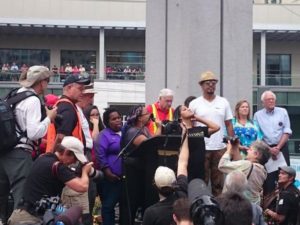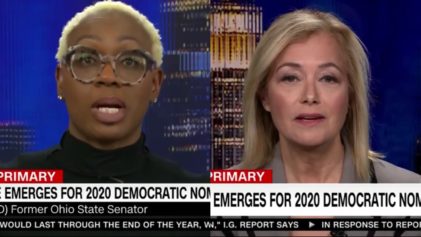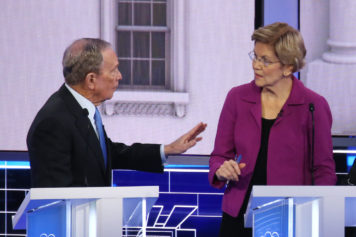In an era of Black Lives Matter, as we near the end of the age of Obama, there are changes afoot in racial politics. The Black vote is all changed up, a reality democrats must face or ignore at their own peril.
Writing for the New York Times Magazine on August 7, Robert Draper used the recent Netroots Nation conference—when #BlackLivesMatter activists interrupted a forum with presidential candidates Bernie Sanders and Martin O’Malley—as a backdrop to point out that 2016 is all about the Black vote.
To make his point, Draper cites a recent report by Amy Walter and David Wasserman in the Cook Political Report entitled, African American Voters: The Overlooked Key To 2016. In that report, the authors argue that for all of the focus on the importance of the Latino vote and whether the Republicans can reclaim it, the Black vote may very well determine the outcome of next year’s election. At issue is that for the first time, Black turnout has been even with white turnout in the 2008 and 2012 elections, and exceeding the white vote in 2012, with 66 percent turnout versus 64 percent. The key to the outcome of the next election, the report claims, is whether the Democrats can maintain an Obama-era level of Black enthusiasm with Obama no longer on the ballot.
“But unlike the rise in the Latino vote, which can be attributed to a surge in population and voting eligibility over the last several decades, the last few cycles’ record African-American turnout was attributable to a historic candidate with a historic ground operation to register and motivate the black community,” the authors write. “So, in addition to asking, ‘What can the GOP do to win more Latinos?’ we should also be asking, ‘What can Hillary do to keep black voters engaged?'”
The Black Lives Matter movement has forced a national dialogue not only on the issues facing Black people, but on terms that are dictated by Black people themselves. Even Republicans have spoken out on issues of racial inequality, as a bipartisan consensus has formed on the need for criminal justice reform and ending the war on drugs and mass incarceration. No one believes the Republicans—which in many ways still serves as a white nationalist party—will win the Black vote in 2016 or in the foreseeable future, and the candidates at the recent Republican debate in Cleveland made little reference to #BlackLivesMatter or Black people.
For the white Democrats running for president, shifting dynamics have meant at least paying lip service to the rhetoric and symbolism of the nascent movement that has spilled over into the political realm. Perhaps the most poignant example of the challenges, or opportunities, facing white liberals and progressives is the case of Senator Bernie Sanders of Vermont.
Sanders, a Brooklyn, New York-born socialist who is senator in Vermont, one of the whitest states in the Union, has couched his political and ideological arguments in terms of economic inequality and class struggle, but without mentioning racial inequality and injustice. Typically, in the past white liberals have been able to ignore race because it did not matter to them, and they were able to take the Black vote for granted.
Following his experience at Netroots Nation, Sanders was shut down a second time by #BlackLivesMatter protesters, this time at a rally for the candidate in Seattle. As the Huffington Post reported, after a moment of silence, one of the protesters named Marissa Johnson asked the crowd to “join us now in holding Bernie Sanders accountable for his actions.” Some whites in the crowd booed.
Black Lives Matter activist demands silence from booing @SenSanders crowd before she speaks #BernieinSeattle pic.twitter.com/Scdk6zVKmn
— Jim Brunner (@Jim_Brunner) August 8, 2015
Some white people in crowd boo & hiss as Black Lives Matter protesters lead 4+ mins of silence #BernieinSeattle pic.twitter.com/sQQKJCe9MY — Jim Brunner (@Jim_Brunner) August 8, 2015
Although being forced to confront the interruptions of Black protesters may serve as an inconvenience for some white Bernie Sanders supporters, at a campaign event that was undoubtedly a white space, the deaths of Black bodies to police violence are an even greater inconvenience to Black people. At least one Black Sanders supporter, however, posted on YouTube that the protesters so not speak for the majority.
As Raw Story reported, the Sanders supporter said the protesters “don’t speak for the 15,000 people who showed up to see you of all races, black, white, Chinese, Native American, all of it.”
“You speak for all of us,” he said of Sanders. “You need to stay on-message. Often the loudest voices in society don’t come from the largest population. It comes from, sometimes, the smallest groups, the people who are the most angry.” He added, “I don’t want you to fall in the trap that the media has set. I saw an article that said, ‘Can Bernie Sanders court #BlackLivesMatter?’”
Nevertheless, the recent actions of the Sanders camp indicate they need to change direction. For example, as the Huffington Post reports, the candidate has articulated a platform on racial inequality. The platform covers in detail what Sanders calls “the four central types of violence waged against black and brown Americans: physical, political, legal and economic.” Sanders introduced the proposal to 20,000 people in Portland. Also in Portland, as reported by BuzzFeed, the Sanders campaign implemented a new tactic to deal with the #BlackLivesMatter protesters. Symone Sanders, a Black woman and activist just hired as national press secretary for the candidate, told the crowd to cheer “We Stand Together” over and over in the event of a “disruption” at the Portland rally.
The policy proposals, along with the hiring of Symone Sanders as press secretary—which according to the Huffington Post suggests the campaign wants to align itself more closely with the Black protest movement—could demonstrate that the senator, and white Democrats in general, are beginning to understand the new realities of racial politics and the Black vote.
On the other hand, this could be an example of window dressing and tokenism, but time will tell.



